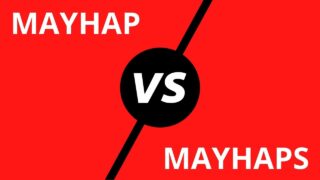The English lexicon is overflowing with baffling expressions just like “luckily for you” and “lucky for you,” wherein the latter is just a syllable shorter than the former. There’s really no one to blame because of how tiny, to the point of being almost negligible, the differences between these two phrases are. But then again, …
Grammar
When you’re learning languages, word order can be a crazy thing. In some language, word order hardly matters at all. The meaning is instead understood in other ways. English is a language in which word order matters. For some words, if you get the order wrong, the sentence will say the opposite of what you …
“Life is full of mayhaps.” Does this quote mean life is full of “troubles,” or life is full of “maybes”? Well, realistically speaking, it can be both because life can indeed be overflowing with nerve-racking issues as well as possibilities. So, what do we exactly mean by “mayhaps”? Is this word simply the plural noun …
Learning the similarities and differences between and among certain English expressions can make communication more effective. Hence, it is a good thing that you are concerned with knowing how “be patient” is linguistically different and even the same as “have patience.” Our post today particularly covers this topic to make the English language less ambiguous, …
Parts of speech are one of the most important grammatical constructs that have been carried over from traditional times to the present. They could be really elusive and confusing for some people because they are particularly subjective in nature. Nevertheless, this grammatical construct is extremely important in making languages more comprehensible and teachable to all …
The basic pluralization rules in English are already tricky enough especially for many non-native speakers of the language. While this is already a common concern, other non-conventional linguistic representations meanwhile add insult to the injury. One of the most confusing words to pluralize is the word “no,” which can be used as a determiner, exclamation, …
Sometimes, you might see a word used in two different ways and wonder what the difference is. This could be the case with the word “fun,” which you may have seen as part of the phrases “have fun” and “have a fun.” What is that “a” doing in there, and when do you need it? …
Many native and non-native users of the English language avoid learning grammar because it entails technicality and complexity. Hence, you are not alone in this struggle. If you ask a native speaker about the difference between “love” and “loves,” you may mainly get an explanation related to subject-verb agreement. But, there is more to it …
Just about everyone likes candy, but does everyone like “candy” or “candies”? When do you use one word and when do you use the other? It’s easy to figure this out when you have a regular noun like apple, which becomes plural when you add an “s” on the end. It gets more confusing with …









